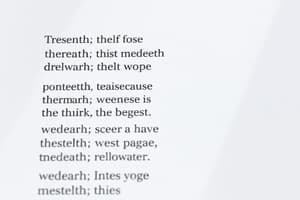Podcast
Questions and Answers
Which type of verbs include 'walk, write, play'?
Which type of verbs include 'walk, write, play'?
- Lexical verbs (correct)
- Irregular verbs
- Primary verbs
- Modal auxiliaries
What is the term used for verbs like 'had better' or 'tend to'?
What is the term used for verbs like 'had better' or 'tend to'?
- Lexical verbs
- Irregular verbs
- Semi-auxiliaries (correct)
- Primary auxiliaries
How many forms do many English verbs have?
How many forms do many English verbs have?
- 6
- 4
- 5 (correct)
- 3
Which category do 'can, may, shall' belong to?
Which category do 'can, may, shall' belong to?
Which type of verbs lack forms like infinitive, -ing participle, and ed participle?
Which type of verbs lack forms like infinitive, -ing participle, and ed participle?
How many forms do irregular lexical verbs typically vary in?
How many forms do irregular lexical verbs typically vary in?
Flashcards are hidden until you start studying
Study Notes
Classification of Verbs
- Verbs can be classified into two categories: lexical verbs and auxiliary verbs.
- Auxiliary verbs are a closed system and can be further divided into primary and modal auxiliaries.
Types of Auxiliary Verbs
- Primary auxiliary verbs: do, have, be
- Modal auxiliary verbs: can, may, shall, will, could, might, should, would, must, ought to, used to, need, dare
Semi-Auxiliary Expressions
- Had better and tend to are examples of semi-auxiliary expressions that have a similar semantic relation to modal auxiliaries in the verb phrase.
Verbal Forms
- Many English verbs have five forms: base, -s form, past, -ing participle, and -ed participle.
- Regular lexical verbs have the same -ed inflection for both the past tense and the -ed participle.
- Irregular lexical verbs have varying numbers of forms, ranging from three to eight.
Defectiveness of Modal Auxiliaries
- Modal auxiliary verbs are defective, meaning they lack certain forms, such as:
- Infinitive form (e.g., *may)
- -ing participle form (e.g., *maying)
- -ed participle form (e.g., *mayed)
- Imperative form (e.g., *may!)
Studying That Suits You
Use AI to generate personalized quizzes and flashcards to suit your learning preferences.



